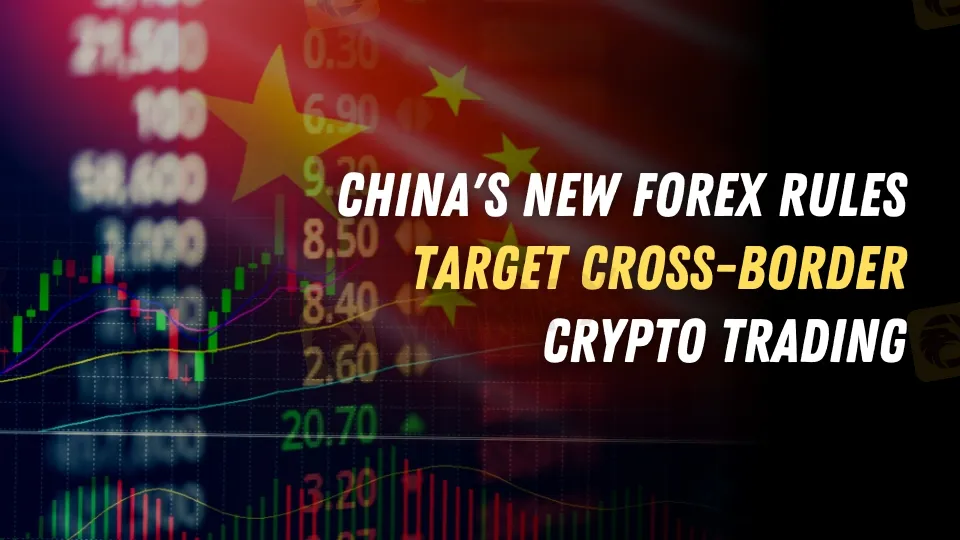简体中文
繁體中文
English
Pусский
日本語
ภาษาไทย
Tiếng Việt
Bahasa Indonesia
Español
हिन्दी
Filippiiniläinen
Français
Deutsch
Português
Türkçe
한국어
العربية
China's New Forex Rules Target Cross-Border Crypto Trading
Abstract:China's new forex rules tighten monitoring of cross-border crypto trades, requiring banks to track identities, fund sources, and trading frequencies.

China's new foreign exchange (FX) rules strengthen curbs on cross-border cryptocurrency trading in order to combat unlawful financial activity. These laws are yet another step in the country's continued efforts to impose its anti-crypto policy.
The Chinese foreign exchange regulator now compels banks to monitor and warn of potentially dangerous currency transactions, including those using cryptocurrencies. This includes cross-border gambling, underground banking, and other illegal financial transactions. Banks must now track the identities of individuals and institutions, as well as their funding sources and trade frequency.
According to a December 31 story by the South China Morning Post, new laws will make it more difficult for residents to own digital assets. According to Liu Zhengyao, a lawyer at ZhiHeng law firm, the regulations strengthen the legal basis for punishing crypto-related actions. He also pointed out that utilizing the yuan to buy cryptocurrency before converting it to foreign fiat currencies is now considered cross-border activity, making it practically difficult to avoid the limitations.
China has banned cryptocurrency trades since 2019. The government's main objectives were to reduce energy usage from cryptocurrency mining and to control greenhouse gas emissions. Financial institutions are also barred from conducting transactions involving digital assets or crypto-mining operations.
Despite its stringent policies, China remains the world's second-largest Bitcoin holder. According to Bitbo's Bitcoin Treasuries tracker, the government has roughly 194,000 BTC worth $18 billion. These holdings were acquired through asset seizures tied to illegal operations, as China's ban prohibits it from actively purchasing Bitcoin.

Number of countries holding Bitcoin. Source: BitcoinTreasuries.NET by Bitbo
Former Binance CEO Changpeng “CZ” Zhao claimed that China may someday adopt a Bitcoin reserve policy. Zhao stated at the Bitcoin MENA event in Abu Dhabi that if China chose to embrace Bitcoin, it may quickly adopt policies.
Final Thoughts:
China's new FX regulations highlight its commitment to regulating cross-border financial operations and curbing the usage of digital assets. These policies reflect the government's overarching purpose of ensuring financial stability and control. As the global cryptocurrency market evolves, the impact of China's policies on international markets and the future of cryptocurrencies will be crucial to monitor.

Disclaimer:
The views in this article only represent the author's personal views, and do not constitute investment advice on this platform. This platform does not guarantee the accuracy, completeness and timeliness of the information in the article, and will not be liable for any loss caused by the use of or reliance on the information in the article.
Read more

Gold Prices Fluctuate: What Really Determines Their Value?
Gold prices have been fluctuating recently, influenced by multiple factors. Since the beginning of 2025, gold has risen by 11%, hitting new historic highs multiple times in the first quarter.

Investors Beware! A Trillion Naira Wiped Out in a Week
Market takes a hit: a trillion naira wiped out—what happened?

Dollar Under Fire—Is More Decline Ahead?
The dollar faces its biggest decline of the year, strong-dollar logic challenged.

Be Aware of AI-Driven Scams in 2025
Artificial intelligence is reshaping industries, but its rapid adoption has also opened new avenues for fraudsters. In 2025, platforms like Facebook, X, and Telegram are emerging as hotbeds for scams targeting investors. Regulators, including NASAA, have raised alarms about the growing use of AI to deceive and defraud unsuspecting victims.
WikiFX Broker
Latest News
Forex Trading: Scam or Real Opportunity?
The Hidden Tactics Brokers Use to Block Your Withdrawals
Beware: Online Share Buying Scam Costs 2,791,780 PHP in Losses
5 things I wish someone could have told me before I chose a forex broker
Unmasking a RM24 Million Forex Scam in Malaysia
U.S., Germany, and Finland Shut Down Garantex Over Money Laundering Allegations
Gold Prices Fluctuate: What Really Determines Their Value?
Dollar Under Fire—Is More Decline Ahead?
What Impact on Investors as Oil Prices Decline?
Is the North Korea's Lazarus Group the Biggest Crypto Hackers or Scapegoats?
Currency Calculator






